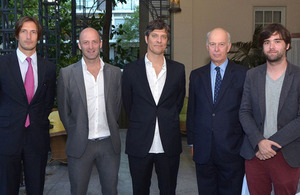Local leaders took part of Chevening TALKS in Argentina
The British Embassy and the Chevening Alumni Network hosted the second edition of the Leadership Talks at the Ambassador’s Residence.

From left to right: Ivan de Pineda, Estanislao Bachrach, Mario Pergolini, British Ambassador John Freeman and Santiago Siri
Mario Pergolini, Santiago Siri and Estanislao Bachrach took part in a new edition of the Chevening TALKS on Leadership organised by the British Embassy and the Chevening Alumni Network in Argentina and presented by Iván de Pineda.
All three speakers agreed that a leader should be able to benefit from the new technologies and understand their potential impact on people’s minds, human relationships and consumer behaviour.
British Ambassador John Freeman opened the event, which attracted about a hundred Chevening alumni as well as business and political leaders. He also launched the Chevening Scholarships Programme Yearbook containing details of 400 former scholars from Argentina who are part of a global network of more than 42,000 leaders in 100 countries.
Mario Pergolini, founder of Vorterix, said that, in response to continuing innovation and changes in the demands of the audience, the media should offer differential contents that will rapidly and inevitably become commodities. “We are exclusive owners of our contents for a very brief period of time”, he stated after explaining how the Vorterix Project had started off as a theatre and a radio and now also includes business units that provide, for example, streaming services and videogames.
“We will shortly be expanding our business to include another venue for shows and will also make our way into the world of pop”, he announced.
Estanislao Bachrach, a scientists and author of “AgilMente” (Agile Mind), focused on the human mind as a tool for change and listed the qualities of an effective leader. He said that a leader understands not only how different stimuli affect the brain, but also the behaviours and attitudes that that enable leaders to motivate their teams and bring about change.
“Effective leaders are those who can delegate rather than monopolise and do not represent a threat to their teams”, he added.
Santiago Siri, a technologist and founder of an Internet-based political party known as Partido de la Red, explained that the Internet has opened up “new spaces for debate” and now enables a large number of people to set up networks to discuss and develop specific projects. “New leaders”, he concluded, “are those who can use the new technologies to promote changes in the way we practise politics.”
British Ambassador John Freeman presented the Yearbook, which contains the details of all 400 alumni who are part of Argentina’s Chevening network. “These young Argentine leaders were awarded a scholarship by the British Government to pursue post-graduate studies in the UK”. Today, there are 9 Argentine Chevening scholars studying for their Masters degrees in the UK. The call for applications for the 2014 scholarships is open until mid-November.”
Further information
Photos from the event are available at: http://bit.ly/1a7Ao9c
More information on the Chevening Scholarships Programme: www.chevening.org
Facebook: /ukinargentina Twitter: @ukinargentina